Module 11 Unit 1 They touch noses! 课件(共31张PPT,内嵌音频)2020-2021学年外研版英语七年级下册
文档属性
| 名称 | Module 11 Unit 1 They touch noses! 课件(共31张PPT,内嵌音频)2020-2021学年外研版英语七年级下册 | 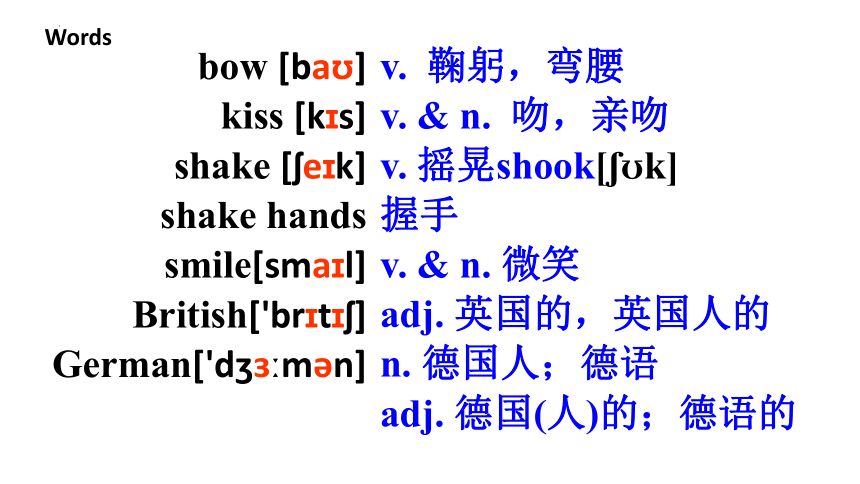 | |
| 格式 | pptx | ||
| 文件大小 | 7.2MB | ||
| 资源类型 | 教案 | ||
| 版本资源 | 外研版 | ||
| 科目 | 英语 | ||
| 更新时间 | 2023-07-22 20:59:47 | ||
图片预览

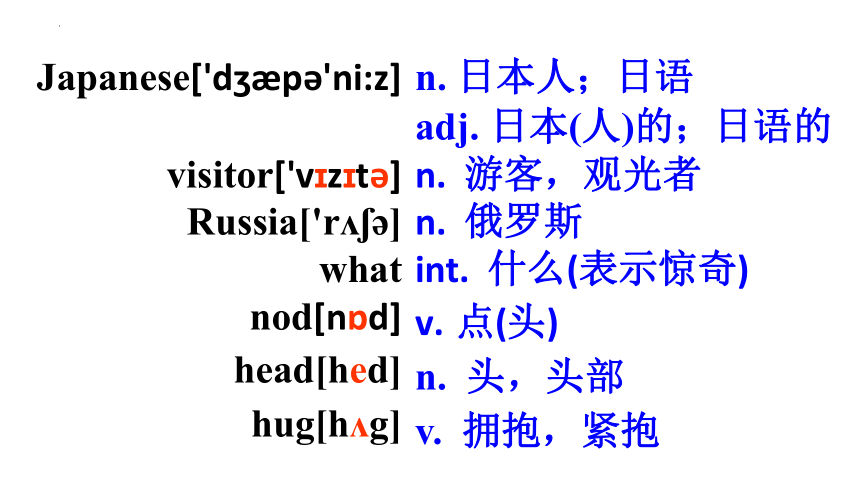
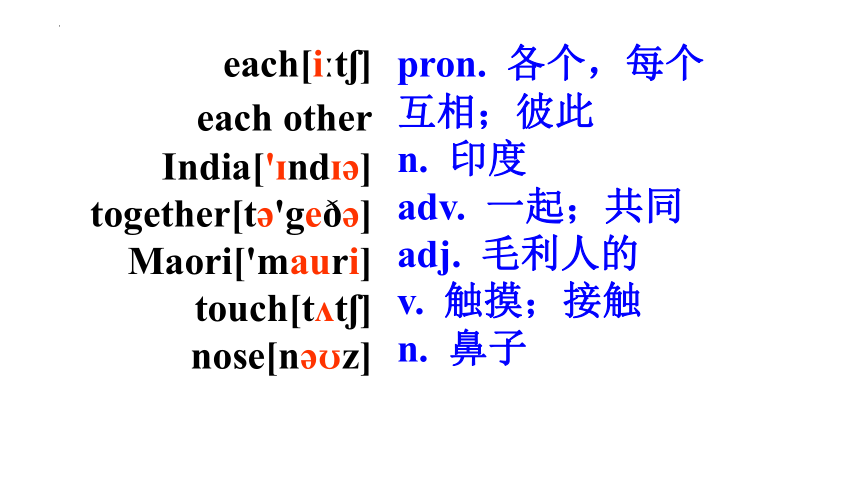
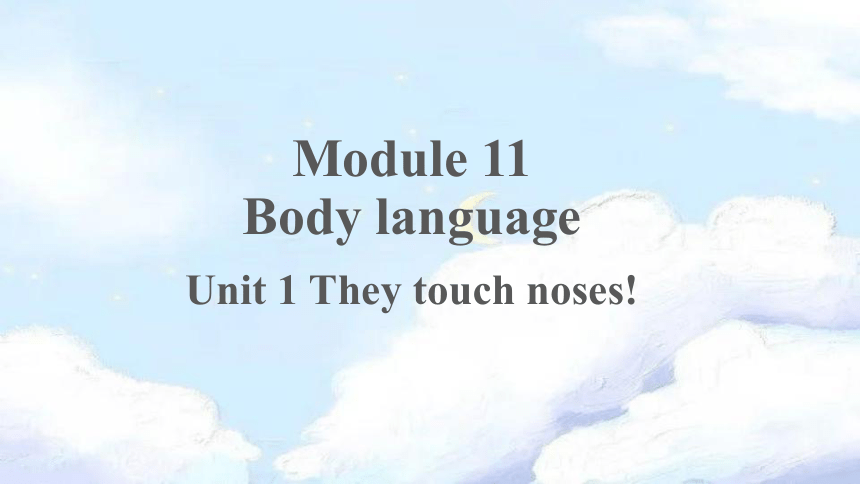
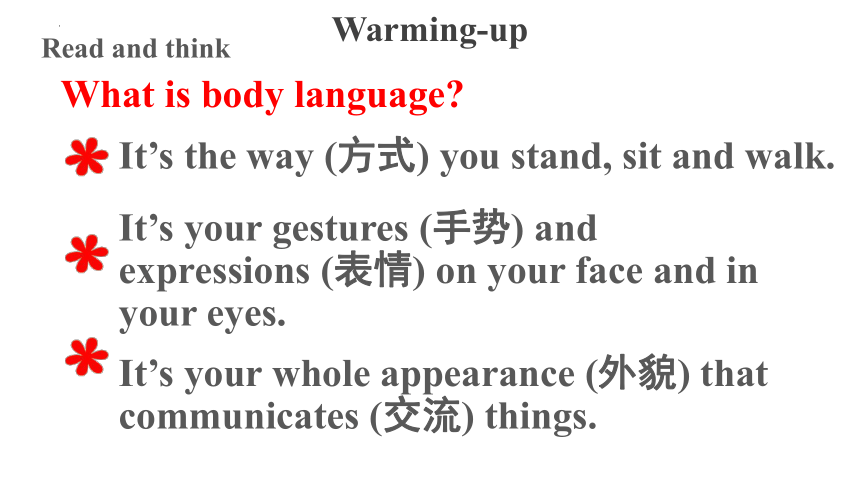
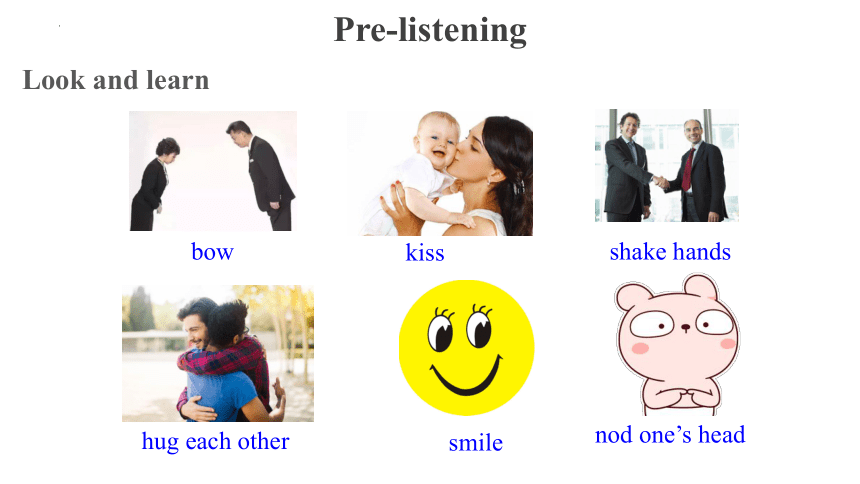
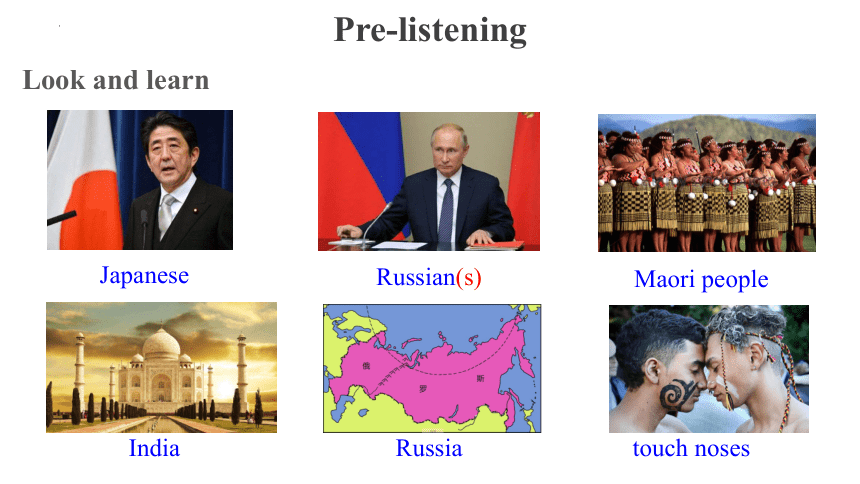
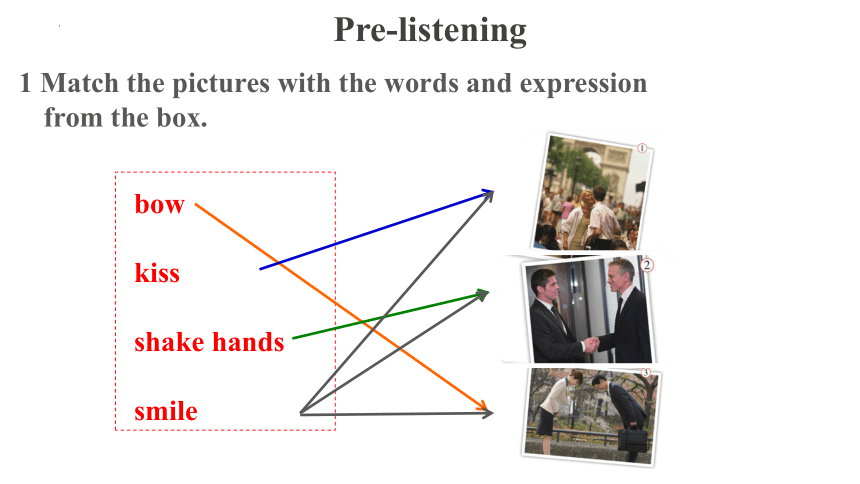
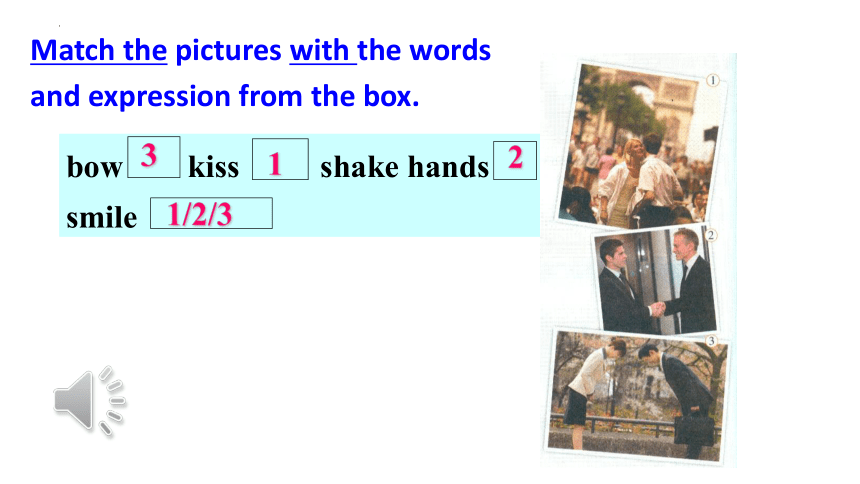
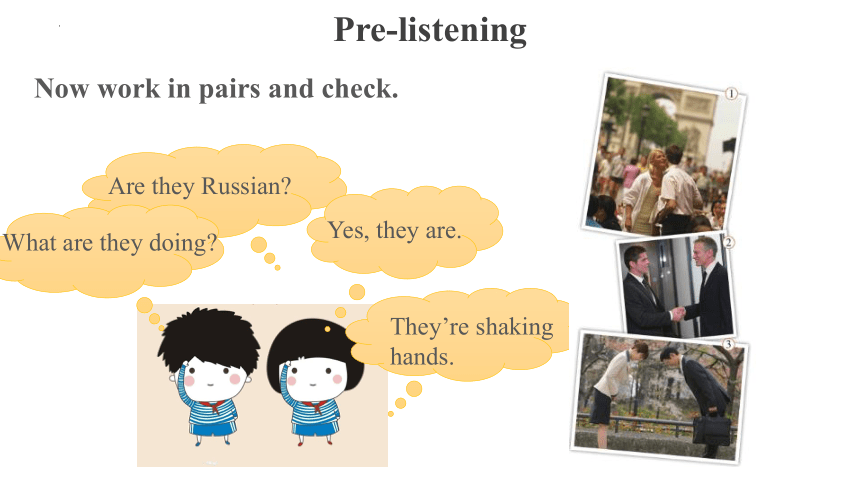
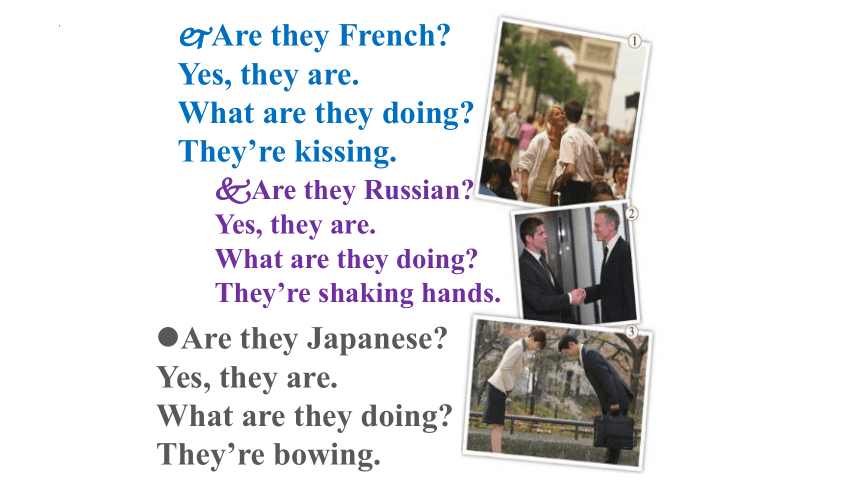
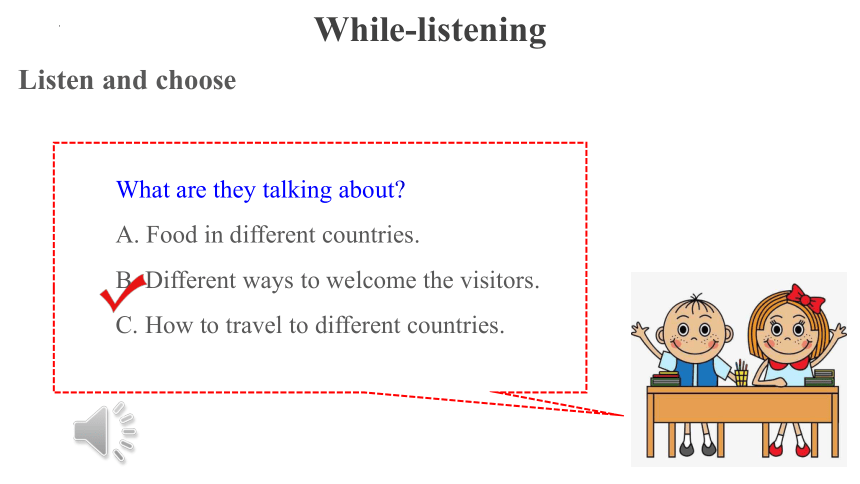
文档简介
(共31张PPT)
bow [ba ]
kiss [k s]
shake [ e k]
shake hands
smile[sma l]
British['br t ]
German['d m n]
v. 鞠躬,弯腰
v. & n. 吻,亲吻
v. 摇晃shook[ k]
握手
v. & n. 微笑
adj. 英国的,英国人的
n. 德国人;德语
adj. 德国(人)的;德语的
Words
Japanese['d p 'ni:z]
visitor['v z t ]
Russia['r ]
what
nod[n d]
head[hed]
hug[h g]
n. 日本人;日语
adj. 日本(人)的;日语的
n. 游客,观光者
n. 俄罗斯
int. 什么(表示惊奇)
点(头)
n. 头,头部
v. 拥抱,紧抱
each[i t ]
each other
India[' nd ]
together[t 'ge ]
Maori['mauri]
touch[t t ]
nose[n z]
pron. 各个,每个
互相;彼此
n. 印度
adv. 一起;共同
adj. 毛利人的
v. 触摸;接触
n. 鼻子
Module 11
Body language
Unit 1 They touch noses!
What is body language
It’s the way (方式) you stand, sit and walk.
It’s your gestures (手势) and expressions (表情) on your face and in your eyes.
It’s your whole appearance (外貌) that communicates (交流) things.
Read and think
Warming-up
Look and learn
bow
kiss
shake hands
nod one’s head
smile
hug each other
Pre-listening
Japanese
India
Maori people
touch noses
Russian(s)
Russia
Look and learn
Pre-listening
1 Match the pictures with the words and expression from the box.
bow
kiss
shake hands
smile
Pre-listening
bow kiss shake hands smile
Match the pictures with the words and expression from the box.
3
2
1
1/2/3
Now work in pairs and check.
Are they Russian
Yes, they are.
What are they doing
They’re shaking hands.
Pre-listening
Are they French
Yes, they are.
What are they doing
They’re kissing.
Are they Russian
Yes, they are.
What are they doing
They’re shaking hands.
Are they Japanese
Yes, they are.
What are they doing
They’re bowing.
Listen and choose
What are they talking about
A. Food in different countries.
B. Different ways to welcome the visitors.
C. How to travel to different countries.
While-listening
Listen and choose the best answer.
1. How many times do people in Russia kiss when they
meet
A. Three times. B. Only once. C. They never kiss.
2. What do Chinese people do when they meet visitors
A. Hug. B. Kiss each other. C. Shake hands and smile.
3. What do Maori people do when they meet
A. Nod their heads. B. Kiss. C. Touch noses.
While-listening
Listen and complete the table.
In China, people shake hands and smile.
When they meet(2) ________
American people shake hands and sometimes(1) ______or hug each other.
In India, people put their hands together and nod (3) heads.
In (4) ____ __, people kiss each other three times.
Maori people (5) _______ noses.
kiss
visitors
their
Russia
touch
Countries What do people in …do when they meet
Russia
China
The US
India
New Zealand
They usually kiss three times, left, right, left.
They often shake hands and smile
They shake hands, kiss or hug each other.
They put their hands together and nod their heads.
Maori people touch noses.
Read the passage to find and underline(在……下面画线) these sentences and make new some sentences.
e.g.:In Russia, people usually kiss three times, left, right, left when they meet visitors.
In Russia, people usually kiss three times, left, right, left when they meet visitors.
In China, people often shake hands and smile when they meet visitors.
In the US, people shake hands, kiss or hug each other when they meet.
In India, people put their hands together and nod their heads when they meet.
In New Zealand, Maori people touch noses when they meet.
Read these sentences together and read loudly!
Language points
1. … in Russia, people usually kiss three times.
times在这里表示次数,three times表示 “三次”。
在英文中,一次是“once/w ns/”,两次是“twice/twa s/”,三次及三次以上都用“基数词+times”。
e.g. My mother goes shopping once a week.
我妈妈每周购物一次。
Post-listening
2. No, I didn’t know that.
这个句子之所以用一般过去时是因为玲玲现在已经知道了, 因为贝蒂刚刚告诉过她,所以她以前不知道,“不知道”已经是过去的事情了。
e.g. Oh, you have two children! I didn’t know that.
哦,你有两个孩子啊!我以前可不知道。
Language points
Post-listening
5 Work in groups. Talk about what you do and say when you meet.
your teacher
your head teacher
your parents after school
your best friend
your best friend’s parents
your favourite film star
a visitor to your school
an American
a Russian
Post-listening
I smile and say good morning.
What do you do and say when you meet your teacher in the morning
Post-listening
5 Work in groups. Talk about what you do and say when you meet.
Do the exercises
一、单项选择。
1. Some ______ visit the Great Wall
every year.
A. visiter B. visitor C. visitors
2. Chinese often ______ when they meet.
A. shake hands B. shakes hands
C. touch noses
Post-listening
3. They help ______ when they are in trouble.
A. each B. each other C. the other
4. They all live ______ in a three-bedroom house.
A. together B. with C. each
5. Would you like to talk with ______
A. German B. Germans C. Germen
Do the exercises
Post-listening
二、用所给单词的适当形式填空。
1. They are some __________ (Russia) people.
2. In __________ (India) people put their hands together and nod their heads when they meet.
3. People usually kiss three _________ (time), left, right, left.
4. There are a lot of _________ (country) in the world.
5. Peter and Julia are _________ (Japan).
Russian
India
times
countries
Japanese
Do the exercises
Post-listening
Words and expressions:
bow, kiss, shake, smile, British, German, Japanese, Russian, visitor, Russia, what, nod, head, hug, each, India, together, Maori, touch, nose, shake hands, each other…
Sentence patterns:
1. How do I do that
2. No, I didn’t know that.
3. So what do people in the US usually do when they meet
Summary
Homework
1. Remember the different ways of greeting.
2. Listen and role-play the dialogue.
Goodbye!
bow [ba ]
kiss [k s]
shake [ e k]
shake hands
smile[sma l]
British['br t ]
German['d m n]
v. 鞠躬,弯腰
v. & n. 吻,亲吻
v. 摇晃shook[ k]
握手
v. & n. 微笑
adj. 英国的,英国人的
n. 德国人;德语
adj. 德国(人)的;德语的
Words
Japanese['d p 'ni:z]
visitor['v z t ]
Russia['r ]
what
nod[n d]
head[hed]
hug[h g]
n. 日本人;日语
adj. 日本(人)的;日语的
n. 游客,观光者
n. 俄罗斯
int. 什么(表示惊奇)
点(头)
n. 头,头部
v. 拥抱,紧抱
each[i t ]
each other
India[' nd ]
together[t 'ge ]
Maori['mauri]
touch[t t ]
nose[n z]
pron. 各个,每个
互相;彼此
n. 印度
adv. 一起;共同
adj. 毛利人的
v. 触摸;接触
n. 鼻子
Module 11
Body language
Unit 1 They touch noses!
What is body language
It’s the way (方式) you stand, sit and walk.
It’s your gestures (手势) and expressions (表情) on your face and in your eyes.
It’s your whole appearance (外貌) that communicates (交流) things.
Read and think
Warming-up
Look and learn
bow
kiss
shake hands
nod one’s head
smile
hug each other
Pre-listening
Japanese
India
Maori people
touch noses
Russian(s)
Russia
Look and learn
Pre-listening
1 Match the pictures with the words and expression from the box.
bow
kiss
shake hands
smile
Pre-listening
bow kiss shake hands smile
Match the pictures with the words and expression from the box.
3
2
1
1/2/3
Now work in pairs and check.
Are they Russian
Yes, they are.
What are they doing
They’re shaking hands.
Pre-listening
Are they French
Yes, they are.
What are they doing
They’re kissing.
Are they Russian
Yes, they are.
What are they doing
They’re shaking hands.
Are they Japanese
Yes, they are.
What are they doing
They’re bowing.
Listen and choose
What are they talking about
A. Food in different countries.
B. Different ways to welcome the visitors.
C. How to travel to different countries.
While-listening
Listen and choose the best answer.
1. How many times do people in Russia kiss when they
meet
A. Three times. B. Only once. C. They never kiss.
2. What do Chinese people do when they meet visitors
A. Hug. B. Kiss each other. C. Shake hands and smile.
3. What do Maori people do when they meet
A. Nod their heads. B. Kiss. C. Touch noses.
While-listening
Listen and complete the table.
In China, people shake hands and smile.
When they meet(2) ________
American people shake hands and sometimes(1) ______or hug each other.
In India, people put their hands together and nod (3) heads.
In (4) ____ __, people kiss each other three times.
Maori people (5) _______ noses.
kiss
visitors
their
Russia
touch
Countries What do people in …do when they meet
Russia
China
The US
India
New Zealand
They usually kiss three times, left, right, left.
They often shake hands and smile
They shake hands, kiss or hug each other.
They put their hands together and nod their heads.
Maori people touch noses.
Read the passage to find and underline(在……下面画线) these sentences and make new some sentences.
e.g.:In Russia, people usually kiss three times, left, right, left when they meet visitors.
In Russia, people usually kiss three times, left, right, left when they meet visitors.
In China, people often shake hands and smile when they meet visitors.
In the US, people shake hands, kiss or hug each other when they meet.
In India, people put their hands together and nod their heads when they meet.
In New Zealand, Maori people touch noses when they meet.
Read these sentences together and read loudly!
Language points
1. … in Russia, people usually kiss three times.
times在这里表示次数,three times表示 “三次”。
在英文中,一次是“once/w ns/”,两次是“twice/twa s/”,三次及三次以上都用“基数词+times”。
e.g. My mother goes shopping once a week.
我妈妈每周购物一次。
Post-listening
2. No, I didn’t know that.
这个句子之所以用一般过去时是因为玲玲现在已经知道了, 因为贝蒂刚刚告诉过她,所以她以前不知道,“不知道”已经是过去的事情了。
e.g. Oh, you have two children! I didn’t know that.
哦,你有两个孩子啊!我以前可不知道。
Language points
Post-listening
5 Work in groups. Talk about what you do and say when you meet.
your teacher
your head teacher
your parents after school
your best friend
your best friend’s parents
your favourite film star
a visitor to your school
an American
a Russian
Post-listening
I smile and say good morning.
What do you do and say when you meet your teacher in the morning
Post-listening
5 Work in groups. Talk about what you do and say when you meet.
Do the exercises
一、单项选择。
1. Some ______ visit the Great Wall
every year.
A. visiter B. visitor C. visitors
2. Chinese often ______ when they meet.
A. shake hands B. shakes hands
C. touch noses
Post-listening
3. They help ______ when they are in trouble.
A. each B. each other C. the other
4. They all live ______ in a three-bedroom house.
A. together B. with C. each
5. Would you like to talk with ______
A. German B. Germans C. Germen
Do the exercises
Post-listening
二、用所给单词的适当形式填空。
1. They are some __________ (Russia) people.
2. In __________ (India) people put their hands together and nod their heads when they meet.
3. People usually kiss three _________ (time), left, right, left.
4. There are a lot of _________ (country) in the world.
5. Peter and Julia are _________ (Japan).
Russian
India
times
countries
Japanese
Do the exercises
Post-listening
Words and expressions:
bow, kiss, shake, smile, British, German, Japanese, Russian, visitor, Russia, what, nod, head, hug, each, India, together, Maori, touch, nose, shake hands, each other…
Sentence patterns:
1. How do I do that
2. No, I didn’t know that.
3. So what do people in the US usually do when they meet
Summary
Homework
1. Remember the different ways of greeting.
2. Listen and role-play the dialogue.
Goodbye!
同课章节目录
- Module 1 Lost and found
- Unit 1 Whose bag is this?
- Unit 2 Are they yours?
- Unit 3 Language in use
- Module 2 What can you do ?
- Unit 1 I can play the piano
- Unit 2 I can run really fast
- Unit 3 Language in use
- Module 3 Making plans
- Unit 1 What are you going to do at the weekends?
- Unit 2 We're going to cheer the players.
- Unit 3 Language in use
- Module 4 Life in the future
- Unit 1 Everyone will study at home
- Unit 2 Every family will have a small plane.
- Unit 3 Language in use
- Module 5 Shopping
- Unit 1 What can I do for you?
- Unit 2 You can buy everything on the Internet
- Unit 3 Language in use
- Module 6 Around town
- Unit 1 Could you tell me how to get to the Nationa
- Unit 2 The London Eye is on your right.
- Unit 3 Language in use
- Revision module A
- Module 7 My past life
- Unit 1 I was born in a small village.
- Unit 2 I was born in Quincy.
- Unit 3 Language in use
- Module 8 Story time
- Unit 1 Once upon a time….
- Unit 2 Goldilocks hurried out of the house.
- Unit 3 Language in use
- Module 9 Life history
- Unit 1 He left school and began work at the age of
- Unit 2 He decided to be an actor.
- Unit 3 Language in use
- Module 10 A holiday journey
- Unit 1 What did you do?
- Unit 2 This morning we took a walk.
- Unit 3 Language in use
- Module 11 Body language
- Unit 1 They touch noses!
- Unit 2 Here are some ways to welcome them.
- Unit 3 Language in use
- Module 12 Western music
- Unit 1 It's so beautiful!
- Unit 2 Vienna is the centre of European classical
- Unit 3 Language in use
- Revision module B
